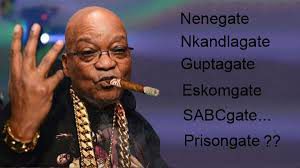Jun 08 2017 07:28 Mike Cohen and Amogelang Mbatha, Bloomberg

President Jacob Zuma.
RELATED ARTICLES
ANC seeks quick process on state-capture probe
Save SA blames GDP shock on ‘recession president’ Zuma
Rand gains as ANC contradicts Zuma on #GuptaEmails, calls for probe
Low growth to weigh heavily on jobs – analysts
Zuma: Radical economic transformation a gospel truth
What’s good for the ANC is no longer good for SA – analyst
Cape Town – A corruption scandal enveloping President Jacob Zuma’s administration has laid bare the chaos swirling around the nation’s law-enforcement agencies and their vulnerability to political manipulation.
Local investigative reporters have published a series of reports over the past two weeks that Zuma allowed members of the wealthy Gupta family to unduly influence government appointments and contracts – known in South Africa as “state capture.” The alleged actions coincided with changes at the heads of the police force, its special investigative unit known as the Hawks and the head of the National Prosecuting Authority.
The amaBhungane Centre for Investigative Journalism and Scorpio, the Daily Maverick news website’s investigative unit, say a trove of as many as 200 000 emails they secured show the Guptas looted billions of rands of state funds. Probes by the Public Protector, a church group and a team of academics have made similar findings. Zuma and the Guptas, who are in business with the president’s son, deny any wrongdoing.
While the Hawks says it’s investigating the leaked emails and the Democratic Alliance has filed criminal cases against Zuma, the Guptas, several cabinet ministers and state-company executives, no one has been charged or arrested.
That is at least partly because politically high-profile cases are rarely prioritised or concluded, a problem compounded by the chaos within the police and prosecuting agency, according to Lawson Naidoo, executive secretary of the Council for the Advancement of the South African Constitution.
‘Deliberately weakened’
“The criminal justice system has been severely and deliberately weakened,” he said by phone from Cape Town. “This is a deliberate part of state capture. There is no capacity to confront it.”
South Africa has had five permanent or acting police chiefs since Zuma took office eight years ago:
Lesetja Mothiba, who took over the post in an acting capacity this month;
Khomotso Phahlane, whose temporary contract ended after a police oversight unit implicated him in a graft probe;
Riah Phiyega, whose competence and integrity was questioned by a panel that investigated the shooting of 34 mine workers by riot police in 2012;
Bheki Cele, who the graft ombudsman found had acted unlawfully when he agreed to pay excessively for office leases;
and Jackie Selebi, who was sentenced to 15 years in prison for corruption in 2010, and died in 2015.
The Hawks also has an acting head, Yolisa Matakata, who was named to the post in April after the High Court found that Berning Ntlemeza’s appointment in December 2014 was unlawful and irregular because he had lied under oath. Ntlemeza’s predecessor, Anwa Dramat, was suspended over allegations of involvement in the arrest and illegal deportation of four Zimbabweans and resigned. Dramat said he was targeted for conducting probes of “very influential people.”
Bond selloff
While chief prosecutor, Shaun Abrahams, is a permanent appointee, his fitness to hold office was questioned following a 2016 decision to file and later drop graft charges against then-finance minister Pravin Gordhan – a move that sparked a sell-off in the nation’s rand and bonds. Abrahams is the fourth head the National Prosecuting Authority since Zuma came to power.
Police Minister Fikile Mbalula said the top management changes show the government’s commitment to stamping out corruption and protecting the integrity of the investigative agencies.
Political agendas have dictated a number of the appointments, and the effect has been to undermine trust in the law-enforcement institutions and processes, according to Roland Henwood, a politics lecturer at the University of Pretoria.
Investigations blocked
“Investigations that are supposed to happen are blocked and investigations that are a complete waste of time, that shouldn’t happen, are being pursued,” Henwood said by phone. “We don’t employ the best people, we employ people that we can manipulate and control.”
South Africa is ranked 64th out of 174 countries in the 2016 Transparency International Corruption Perceptions Index, down three places from the year before. Business executives canvassed by the Geneva-based World Economic Forum last year rated corruption, crime and political instability among the six most problematic factors for doing business in South Africa.
Zuma, who is due to step down as head of the African National Congress in December and as president in 2019, has denied trying to circumvent the criminal-justice system and said he supports the appointment of a judicial commission to probe state capture.
Ralph Mathekga, an analyst at the Mapungubwe Institute for Strategic Reflection, a Johannesburg-based research group, sees the politicization of the law-enforcement agencies as key to what’s gone wrong.
“Those institutions have failed dismally,” Mathekga said by phone. “They are being used as tools to further unsavory kinds of transactions within the state. You can’t undertake state capture in the manner that it seems to have happened without having those institutions to either play ball or deliberately ignore what is happening.”
http://www.fin24.com/Economy/zumas-corruption-scandal-lays-bare-chaos-in-police-20170608

